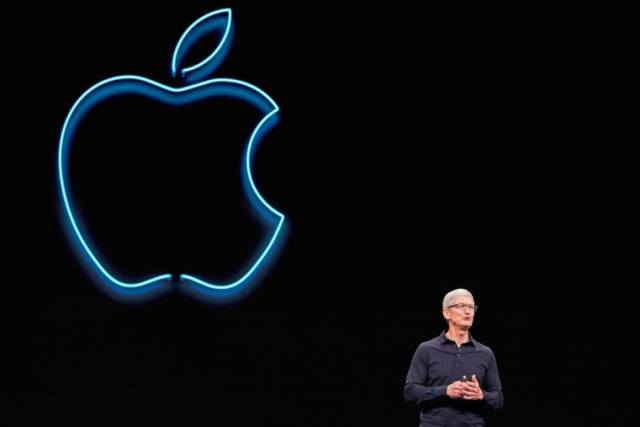Apple buys first-ever carbon-free aluminum from Alcoa-Rio Tinto venture
Apple uses aluminum housings for many of its electronics

Apple CEO Tim Cook speaks during Apple's annual Worldwide Developers Conference in San Jose, California, US June 3, 2019. PHOTO: REUTERS
The metal is being made by Elysis, a Montreal-based joint venture of Alcoa Corp and Rio Tinto announced last year with $144 million in funding from the two companies, Apple and the governments of Canada and Quebec.
The aluminum will be shipped this month from an Alcoa research facility in Pittsburgh and used in Apple products, although the technology company did not say which ones.
Aluminum is carbon-intensive to produce. The smelting process involves passing an electrical current through a large block of carbon called an anode, which burns off during the process and releases carbon dioxide into the atmosphere.
The carbon-free move is a response to consumer, activist and investor demand that miners and manufacturers show they are working to lessen their impact on climate change.
Apple rolls out free repair for iPhone 6S devices
“For more than 130 years, aluminum - a material common to so many products consumers use daily - has been produced the same way. That’s about to change,” Lisa Jackson, Apple’s vice president of environment, policy, and social initiatives, said in a statement.
Apple uses aluminum housings for many of its electronics, including iPhones, Apple Watches and Mac computers. Apple last year introduced Mac models that use recycled aluminum.
The Alcoa-Rio joint venture wants to commercialise the technology by 2024 that uses a ceramic anode to make aluminum and emits only oxygen, eliminating direct greenhouse gas emissions from the smelting process.
London court allows mass claim against Google over iPhone data
Alcoa has already produced test metal with the process and joined with Rio Tinto to bring it up to commercial scale. Elysis plans to license the technology and says that existing smelting facilities can be retrofitted to use it.
The first batch was made in Pittsburgh, but Elysis also plans to manufacture it at a $50 million CAD research facility being built in Saguenay, Quebec, and that is expected to come online in the second half of 2020.
Apple and Elysis would not disclose the size or cost of the first purchase. They described it as a “commercial batch,” and Elysis said the process is expected to have lower operating costs than traditional aluminum smelting.



















COMMENTS
Comments are moderated and generally will be posted if they are on-topic and not abusive.
For more information, please see our Comments FAQ